反义疑问句语法
高考英语反义疑问句用法
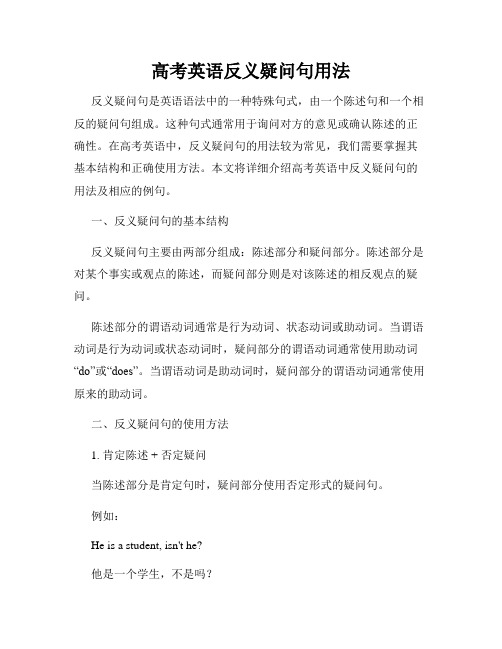
高考英语反义疑问句用法反义疑问句是英语语法中的一种特殊句式,由一个陈述句和一个相反的疑问句组成。
这种句式通常用于询问对方的意见或确认陈述的正确性。
在高考英语中,反义疑问句的用法较为常见,我们需要掌握其基本结构和正确使用方法。
本文将详细介绍高考英语中反义疑问句的用法及相应的例句。
一、反义疑问句的基本结构反义疑问句主要由两部分组成:陈述部分和疑问部分。
陈述部分是对某个事实或观点的陈述,而疑问部分则是对该陈述的相反观点的疑问。
陈述部分的谓语动词通常是行为动词、状态动词或助动词。
当谓语动词是行为动词或状态动词时,疑问部分的谓语动词通常使用助动词“do”或“does”。
当谓语动词是助动词时,疑问部分的谓语动词通常使用原来的助动词。
二、反义疑问句的使用方法1. 肯定陈述 + 否定疑问当陈述部分是肯定句时,疑问部分使用否定形式的疑问句。
例如:He is a student, isn't he?他是一个学生,不是吗?2. 否定陈述 + 肯定疑问当陈述部分是否定句时,疑问部分使用肯定形式的疑问句。
例如:She doesn't speak French, does she?她不会说法语,对吗?3. 陈述部分有实义动词如果陈述部分有实义动词(非助动词),则疑问部分使用助动词“do”或“does”。
例如:They like playing basketball, don't they?他们喜欢打篮球,对吗?4. 陈述部分有助动词如果陈述部分有助动词,则疑问部分使用原来的助动词。
例如:You can swim, can't you?你会游泳,对吗?5. 以let's开头的陈述句以let's开头的陈述句,疑问部分使用shall we。
例如:Let's go to the park, shall we?我们去公园吧,好吗?三、高考英语中的应用示例1. 完成句子The weather is nice today, ________?天气今天不错,是吗?2. 完成句子Tom isn't coming to the party, ________?汤姆不来参加聚会,是吗?3. 完成句子She will never forget this experience, ________?她永远不会忘记这个经历,对吗?4. 完成句子They have already finished their homework, ________?他们已经完成作业了,是吗?5. 完成句子Let's study harder for the exam, ________?让我们更努力地为考试学习,好吗?总结:反义疑问句是高考英语中的常见语法现象,掌握好其基本结构和正确使用方法对于理解和运用该句式非常重要。
高考英语重点语法复习反义疑问句

高考英语重点语法复习反义疑问句Standardization of sany group #QS8QHH-HHGX8Q8-GNHHJ8-HHMHGN#反义疑问句反义疑问句(The Disjunctive Question)又叫附加疑问句(Tag Question)。
在口语中,反义疑问句用于发起谈话、询问信息或是礼貌的请求别人去做某件事。
反义疑问句由两部分组成:前一部分是一个陈述句,后一部分是一个简短的疑问句,两部分的人称时态应保持一致。
总体规则一、反义疑问句的语调1、在说话人知道问题的答案,使用反义疑问句表示请求赞同时,后面的反义疑问句部分用降调。
That film was fantastic, wasn't it ↘2、在说话人不明确问题的答案,使用反义疑问句表示说话人需要核实信息时,后面的反义疑问句部分用升调。
You don't know where the boss is, do you ↗二、反意疑问句中的对应规则:1、反意疑问句中问句部分的谓语动词与陈述部分的谓语动词在语气上成相反的对应关系,即:肯定+否定否定+肯定?①You can’t do it, can you?②They are very late for the meeting, aren’t they?2、反意疑问句中问句部分的动词与陈述部分的动词种类要对应一致。
如:①He has supper at home every day, doesn’t he (不能用hasn’t he)②They have known the matter, haven’t they (不能用don’t they)3、反意疑问句中问句部分的动词在时态上应和陈述部分的时态一致。
如:①They will go to town soon, won’t they (不能用don’t they或aren’t they)②He works very hard, doesn’t he (不能用didn’t he或won’t he)注:当陈述部分是I think 加从句时,疑问句应和从句的人称时态保持一致。
英语语法总结反义疑问句
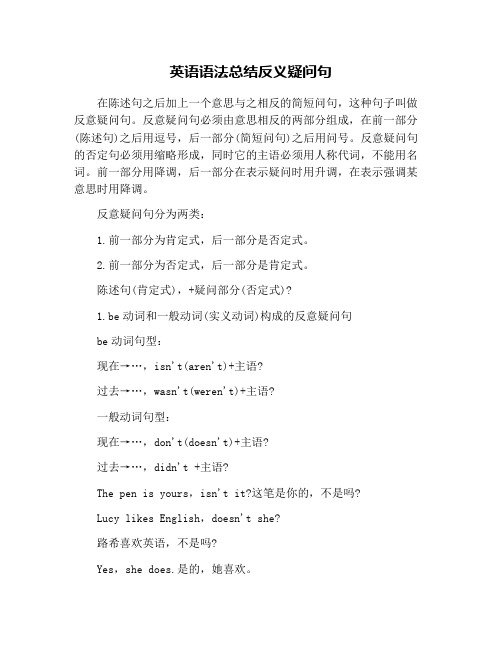
英语语法总结反义疑问句在陈述句之后加上一个意思与之相反的简短问句,这种句子叫做反意疑问句。
反意疑问句必须由意思相反的两部分组成,在前一部分(陈述句)之后用逗号,后一部分(简短问句)之后用问号。
反意疑问句的否定句必须用缩略形成,同时它的主语必须用人称代词,不能用名词。
前一部分用降调,后一部分在表示疑问时用升调,在表示强调某意思时用降调。
反意疑问句分为两类:1.前一部分为肯定式,后一部分是否定式。
2.前一部分为否定式,后一部分是肯定式。
陈述句(肯定式),+疑问部分(否定式)?1.be动词和一般动词(实义动词)构成的反意疑问句be动词句型:现在→…,isn't(aren't)+主语?过去→…,wasn't(weren't)+主语?一般动词句型:现在→…,don't(doesn't)+主语?过去→…,didn't +主语?The pen is yours,isn't it?这笔是你的,不是吗?Lucy likes English,doesn't she?路希喜欢英语,不是吗?Yes,she does.是的,她喜欢。
No,she doesn't.不,她不喜欢。
That was a wonderful night,wasn't it?那是个奇妙的夜晚,不是吗?Yes,it was.是的,它是。
No,it wasn't.不,它不是。
Your sister helped him,didn't she?你姐姐协助了他,不是吗?Yes,she did.是的。
她协助他。
No,she didn't.不。
她没有协助他。
注意反意疑问句中,前后两部分的动词在人称、数和时态上通常保持一致。
另外后一部分的人称代词应和前一部分的主语(名词或代词)保持一致。
Tom is skating,isn't he?(实行时)汤姆在滑冰,不是吗?Yes,he is.是的。
反义疑问句的语法解析

反义疑问句的语法解析反义疑问句是英语中常用的一种问句形式,由一个肯定或否定的陈述句和一个附加问句构成。
通常,陈述部分的形式是简单句,而附加问句则由助动词、情态动词或系动词以及主语构成。
在反义疑问句中,陈述部分和附加问句的形式及意义相反,用来表示询问对方的看法、确认事实或邀请对方赞同。
一、陈述部分与附加问句的一致性在反义疑问句中,陈述部分和附加问句的一致性是十分重要的。
如果陈述部分是肯定的,附加问句应该是否定的;如果陈述部分是否定的,附加问句应该是肯定的。
例如:1. You haven't seen the movie, have you?(你没有看过这部电影,是吗?)2. She is a good singer, isn't she?(她是一个好歌手,不是吗?)反义疑问句的一致性原则旨在通过附加问句对前面的陈述进行确认或邀请对方表达同意。
二、主要使用助动词和情态动词的反义疑问句助动词和情态动词是构成反义疑问句最常用的词类,它们在疑问句中的运用有所不同。
以下分别对助动词和情态动词的反义疑问句进行探讨。
1. 助动词的反义疑问句助动词常用于反义疑问句的构成,根据英语时态和语气的不同,使用的助动词也会有所变化。
比如:1. He is playing soccer, isn't he?(他在踢足球,是吗?)2. She can speak French, can't she?(她会说法语,对吗?)助动词的选择应与陈述部分一致,并且要根据陈述部分的时态和语气来确定是否需要进行时态的转换。
2. 情态动词的反义疑问句情态动词也经常用于构成反义疑问句,常见的情态动词包括can、could、will、would、shall、should、may、might等。
例如:1. You should study hard, shouldn't you?(你应该努力学习,对吗?)2. He might go to the party, mightn't he?(他可能会去参加派对,不是吗?)情态动词的选择要根据陈述部分的意义和语境来确定,以保持整个句子的逻辑和语用准确。
反义疑问句句型
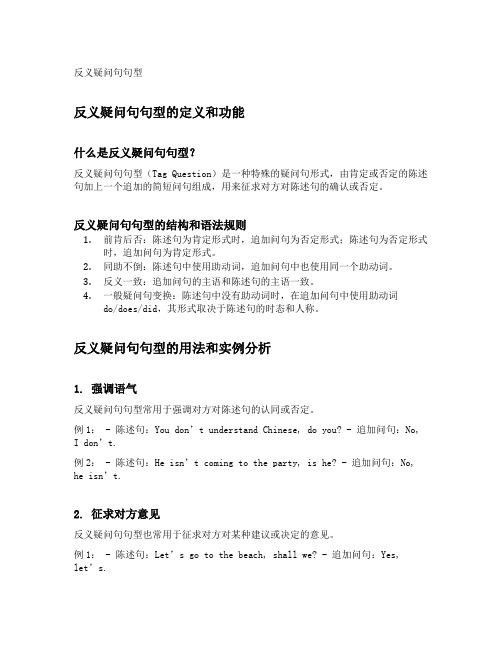
反义疑问句句型反义疑问句句型的定义和功能什么是反义疑问句句型?反义疑问句句型(Tag Question)是一种特殊的疑问句形式,由肯定或否定的陈述句加上一个追加的简短问句组成,用来征求对方对陈述句的确认或否定。
反义疑问句句型的结构和语法规则1.前肯后否:陈述句为肯定形式时,追加问句为否定形式;陈述句为否定形式时,追加问句为肯定形式。
2.同助不倒:陈述句中使用助动词,追加问句中也使用同一个助动词。
3.反义一致:追加问句的主语和陈述句的主语一致。
4.一般疑问句变换:陈述句中没有助动词时,在追加问句中使用助动词do/does/did,其形式取决于陈述句的时态和人称。
反义疑问句句型的用法和实例分析1. 强调语气反义疑问句句型常用于强调对方对陈述句的认同或否定。
例1: - 陈述句:You don’t understand Chinese, do you? - 追加问句:No, I don’t.例2: - 陈述句:He isn’t coming to the party, is he? - 追加问句:No, he isn’t.2. 征求对方意见反义疑问句句型也常用于征求对方对某种建议或决定的意见。
例1: - 陈述句:Let’s go to the beach, shall we? - 追加问句:Yes, let’s.例2: - 陈述句:We shouldn’t tell her, should we? - 追加问句:No, we shouldn’t.3. 确认加强反义疑问句句型可以用来加强陈述句的说服力,让对方更容易接受陈述的内容。
例1: - 陈述句:You’re the best candidate for the job, aren’t you? - 追加问句:Yes, I am.例2: - 陈述句:She always arrives late, doesn’t she? - 追加问句:Yes, she does.4. 提出反驳反义疑问句句型也可用于提出反驳或询问对方的反驳意见。
中小学英语语法(反义疑问句)
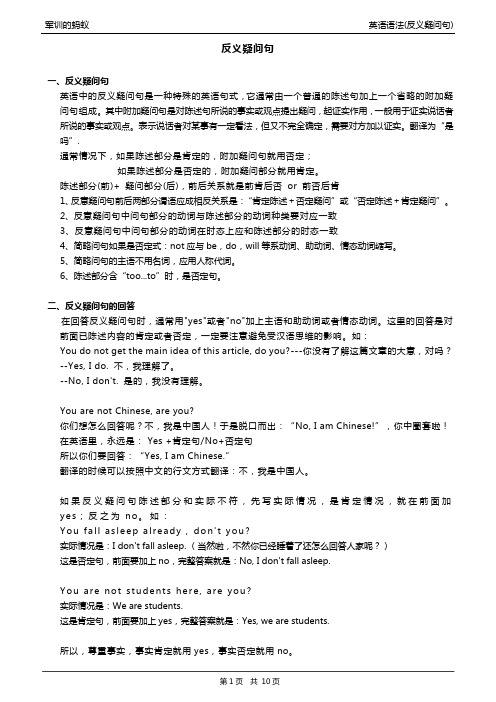
反义疑问句一、反义疑问句英语中的反义疑问句是一种特殊的英语句式,它通常由一个普通的陈述句加上一个省略的附加疑问句组成。
其中附加疑问句是对陈述句所说的事实或观点提出疑问,起证实作用,一般用于证实说话者所说的事实或观点。
表示说话者对某事有一定看法,但又不完全确定,需要对方加以证实。
翻译为“是吗”.通常情况下,如果陈述部分是肯定的,附加疑问句就用否定;如果陈述部分是否定的,附加疑问部分就用肯定。
陈述部分(前)+ 疑问部分(后),前后关系就是前肯后否or 前否后肯1、反意疑问句前后两部分谓语应成相反关系是:“肯定陈述+否定疑问”或“否定陈述+肯定疑问”。
2、反意疑问句中问句部分的动词与陈述部分的动词种类要对应一致3、反意疑问句中问句部分的动词在时态上应和陈述部分的时态一致4、简略问句如果是否定式:not应与be,do,will等系动词、助动词、情态动词缩写。
5、简略问句的主语不用名词,应用人称代词。
6、陈述部分含“too...to”时,是否定句。
二、反义疑问句的回答在回答反义疑问句时,通常用"yes"或者"no"加上主语和助动词或者情态动词。
这里的回答是对前面已陈述内容的肯定或者否定,一定要注意避免受汉语思维的影响。
如:You do not get the main idea of this article, do you?---你没有了解这篇文章的大意,对吗?--Yes, I do. 不,我理解了。
--No, I don't. 是的,我没有理解。
You are not Chinese, are you?你们想怎么回答呢?不,我是中国人!于是脱口而出:“No, I am Chinese!”,你中圈套啦!在英语里,永远是: Yes +肯定句/No+否定句所以你们要回答:“Yes, I am Chinese.”翻译的时候可以按照中文的行文方式翻译:不,我是中国人。
英语语法:反义疑问句专项讲解
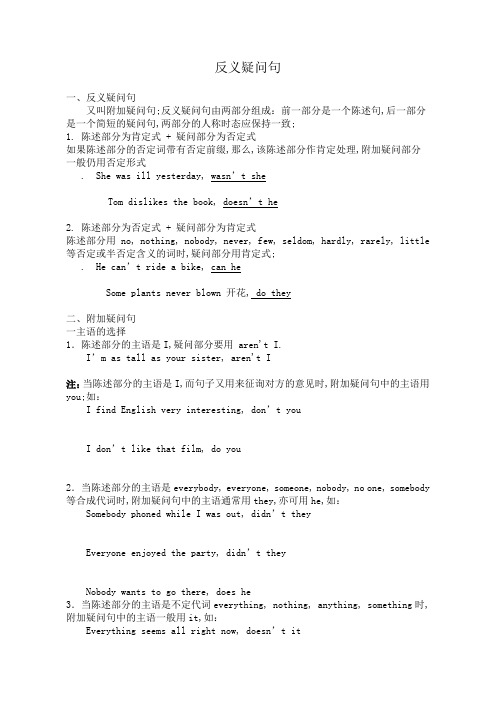
反义疑问句一、反义疑问句又叫附加疑问句;反义疑问句由两部分组成:前一部分是一个陈述句,后一部分是一个简短的疑问句,两部分的人称时态应保持一致;1.陈述部分为肯定式 + 疑问部分为否定式如果陈述部分的否定词带有否定前缀,那么,该陈述部分作肯定处理,附加疑问部分一般仍用否定形式. She was ill yesterday, wasn’t sheTom dislikes the book, doesn’t he2.陈述部分为否定式 + 疑问部分为肯定式陈述部分用 no, nothing, nobody, never, few, seldom, hardly, rarely, little 等否定或半否定含义的词时,疑问部分用肯定式;. He can’t ride a bike, can heSome plants never blown 开花, do they二、附加疑问句一主语的选择1.陈述部分的主语是I,疑问部分要用 aren't I.I’m as tall as your sister, aren't I注:当陈述部分的主语是I,而句子又用来征询对方的意见时,附加疑问句中的主语用you;如:I find English very interesting, don’t youI don’t like that film, do you2.当陈述部分的主语是everybody, everyone, someone, nobody, no one, somebody 等合成代词时,附加疑问句中的主语通常用they,亦可用he,如:Somebody phoned while I was out, didn’t theyEveryone enjoyed the party, didn’t theyNobody wants to go there, does he3.当陈述部分的主语是不定代词everything, nothing, anything, something时,附加疑问句中的主语一般用it,如:Everything seems all right now, doesn’t itNothing is kept in good order, is itSomething must be done to stop pollution, isn’t it4.当陈述部分的主语是指示代词this, that或these, those时,附加疑问句中的主语分别用it和they,如:This is important, isn’t itThat isn’t correct, is itThese are your friends Tom and Jack, aren’t they5.如果陈述部分是以代词one作主语,附加疑问句中的主语在正式场合用one,非正式场合下可以用you或he,如:One can’t be too careful, can one或can youOne should do his duty, shouldn’t he6.当陈述句为there be结构时,附加疑问句中的主语也用there;如:There’s no help for it, is thereThere’s something wrong, isn’t there7.当陈述部分为主从复合句时,附加疑问部分一般应与主句的主语和谓语动词保持对应关系;如:She says that I did it, doesn’t sheI told them not everybody could do it ,didn’t I但当陈述部分的主语是I,谓语是think, believe, suppose, expect这类动词时,附加疑问部分则往往与从句中的主语和谓语动词保持对应关系,但要注意否定的转移;I suppose that he’s serious isn’t heI don’t think she cares, does she8.当陈述部分是并列句,附加疑问句则需和就近的分句的主语和谓语一致;如:Xiao Lin has been writing letters all afternoon but he should finish them now, shouldn’t he9.在由“祈使句+附加疑问”构成的附加疑问句中,附加疑问部分的主语一般用you;如:Don’t open the door, will youGive me some cigarettes, can youTake a rest, why don’t you但以let’s开头的祈使句,附加疑问部分用shall we;以let us开头的祈使句,如果含义是allow us,不包括听话人在内,疑问部分用will you;如:Let’s have a basketball match this afternoon, shall weLet us go out for a rest, will you10.陈述句子中的主语为动词不定式短语、动名词短语或其他短语时,疑问部分的主语通常用it;如:Learning how to repair motors takes a long time, doesn’t itBetween six and seven will suit you, won’t itWhere to hold the meeting has not been decided, has it二谓语动词的选择1.当陈述部分带有情态动词must表示“必须”时,疑问部分用mustn’t;如:You must work hard next term, mustn’t youI must answer the letter, mustn’t I但若表推测这层含义时,不能用must,而要根据陈述部分的不定式结构即must之后的动词以及含义采用相应的动词形式;如:You must have made a mistake, haven’t youThey must have seen the film last week, didn’t theyHe must be in the library, isn’t he2.当陈述部分含有used to时,疑问部分可用usedn’t或didn’t;如:The old man used to smoke, didn’t /usedn’t heTom used to live here, usedn’t /didn’t he3.当陈述部分带有情态动词ought to时,疑问部分用oughtn’t或shouldn’t;如:He ought to know the answer, oughtn’t heWe ought to read this book, oughtn’t/ shouldn’t we4.当陈述部分含有情态动词dare或need时,疑问部分常用 need /dare +主语;We need not do it again, need weHe dare not say so, dare you但当dare, need 为实义动词时,疑问部分用助动词do + 主语;She doesn't dare to go home alone, does she5.当陈述部分含有had better时,疑问部分用hadn’t; 如:You’d better finish your homework now, hadn’t you6.感叹句后的附加疑问句的谓语动词需用be的现在时,且常用否定形式;如:What a clever boy, isn’t heWhat a lovely day, isn’t it7.陈述句中的谓语动词是wish,表示愿望时,附加疑问句用may,且用肯定形式;如:I wish to have a chance to learn English, may I8.当陈述部分带有表示“所有”含义的动词havehas时,疑问部分既可用have形式,也可用do形式;如:You have a new bike, haven’t you或don’t youShe doesn’t have any money in her pocket, does she9.陈述部分有have to +v. had to + v.,疑问部分常用don't +主语didn't +主语;如:We have to get there at eight tomorrow, don't we10.陈述部分有would rather +v.,疑问部分多用 wouldn't +主语;如:He would rather read it ten times than recite it, wouldn't he11.陈述部分有You'd like to +v. 疑问部分用wouldn't +主语;如:12.陈述部分由neither… nor, either… or 连接的并列主语时,疑问部分根据其实际逻辑意义而定;Neither you nor I am engineer, are we13.在口语和非正式文体中,为了加强语气,只是表示某种惊奇、怀疑、反感、讽刺等感情而并不是为了寻求回答,这时前后两部分的肯定、否定是一致的;如:Oh, he is a writer, is heYou’ll not go, won’t you三反义疑问句的回答对反意疑问句的回答,无论问题的提法如何,如果事实是肯定的,就用yes,事实是否定的,就要用no;例:—He likes playing football, doesn’t he 他喜欢踢足球,是吗—Yes, he does. / No, he doesn’t. 是的,他喜欢;/ 不是,他不喜欢;当陈述句部分是否定结构,附加疑问句部分用肯定式提问时,回答yes或no与汉语的意思正好相反;这种回答的yes要译成“不”,no要译成“是”;—His sister didn’t attend the meeting, did she 他妹妹没有参加会议,是吗—Yes, she did. / No, she didn’t. 不,她参加了;/ 是的,她没参加;反义疑问句练习1. Linda ate nothing this morning, ___A. didn’t sheB. was sheC. did sheD. wasn’t she2. There’s hardly___ milk in the bottle, _____thereA. no, isn’tB. some, isC. little, isn’tD. any, is3. He has never ridden a horse before, ___A. does heB. has heC. hasn’t heD. doesn’t he4. — He seldom came here, _____ — Yes sir.A. didn’t heB. does heC. doesn’t heD. did he5. Everything seems all right, _____A. does itB. don’t theyC. won’t itD. doesn’t itA. oneB. heC. itD. we8. No one failed in the exam, _____A. was heB. did oneC. did theyD. didn’t he10. Neither you nor I am a artist, _____A. am IB. aren’t weC. are weD. ain’t I11. He can’t be her father, _____ heA. isB. isn’tC. canD. can’t12. They have no time to visit the museum, _____A. do theyB. haven’t theyC. don’t theyD. will they14. You’d better go at once, _____ youA. hadn’tB. didC. didn’tD. don’t15. You’d rather work than play, _____ youA. hadn’tB. wouldn’tC. didn’tD. mustn’t16. You dare not do that, _____ youA. don’tB. doC. dareD.daren’t18. He dislikes the two subjects, _____ heA. doesB. doesn’tC. isD.isn’t19. These tools are useless now, _____A. are theyB. aren’t theyC. is itD. isn’t it20. He used to get up at 6:30, _____ heA. didn’t heB. did heC. used heD. wouldn’t heA. mustn’tB. oughtn’tC. shouldn’tD. Both B and C.23. Let’s go there by bus, ___A. will youB. shall weC. don’t youD. will you24. Let us go to play football, ___A. will youB. shall weC. do weD. are we25. Don’t forget to give Polly some food and change her water, ___A. will youB. shall weC. won’t youD. do you26. —Let’s go shopping this afternoon, _____ — All right.A. will weB. shall weC. don’t weD. are we27. — Pass me the dictionary, _____— Yes, with pleasure.A. would youB. will youC. won’t youD. wouldn’t you30. There is little water in the glass, ____A. isn’t thereB. isn’t itC. is itD. is there32. There won’t be any concert this Saturday evening, _____A. will there notB. will thereC. is thereD. won’t33. — I guess she taught herself Japanese, ______ — Yes.A. don’t IB. did sheC. do ID. didn’t she34. I don’t believe you are right, _____A. are youB. do youC. won’t youD. do35. She doesn’t think that Tom sings best in the class, _____A. does sheB. doesn’t sheC. does heD. doesn’t he37. I know you didn’t want to hurt me, _____A. did youB. didn’t youC. do ID. don’t I38. If my father were here, he would be very happy, _____A. weren’t heB. were heC. wouldn’t heD. would he。
反义疑问句归纳整理
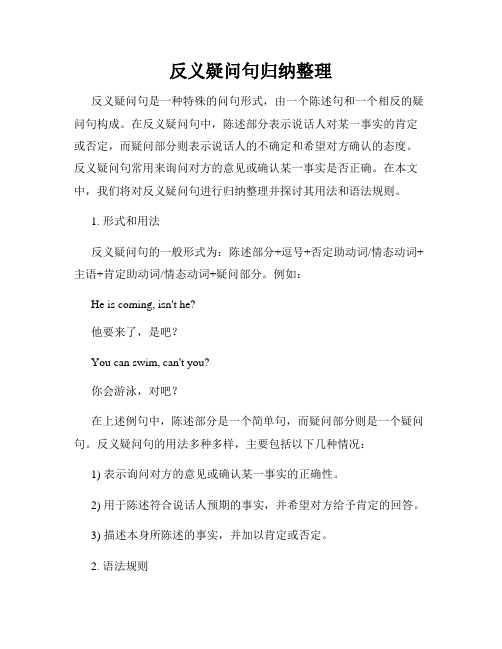
反义疑问句归纳整理反义疑问句是一种特殊的问句形式,由一个陈述句和一个相反的疑问句构成。
在反义疑问句中,陈述部分表示说话人对某一事实的肯定或否定,而疑问部分则表示说话人的不确定和希望对方确认的态度。
反义疑问句常用来询问对方的意见或确认某一事实是否正确。
在本文中,我们将对反义疑问句进行归纳整理并探讨其用法和语法规则。
1. 形式和用法反义疑问句的一般形式为:陈述部分+逗号+否定助动词/情态动词+主语+肯定助动词/情态动词+疑问部分。
例如:He is coming, isn't he?他要来了,是吧?You can swim, can't you?你会游泳,对吧?在上述例句中,陈述部分是一个简单句,而疑问部分则是一个疑问句。
反义疑问句的用法多种多样,主要包括以下几种情况:1) 表示询问对方的意见或确认某一事实的正确性。
2) 用于陈述符合说话人预期的事实,并希望对方给予肯定的回答。
3) 描述本身所陈述的事实,并加以肯定或否定。
2. 语法规则在构成反义疑问句的过程中,需要遵循一些语法规则,以确保句子的正确性和逻辑性。
2.1 句子主语在反义疑问句中,疑问部分的主语通常与陈述部分一致。
例如:She likes ice cream, doesn't she?她喜欢冰淇淋,对吧?You have finished your homework, haven't you?你完成了作业,是吧?2.2 肯定和否定疑问部分的肯定或否定助动词/情态动词取决于陈述部分的肯定或否定。
如果陈述部分是肯定的,疑问部分的助动词/情态动词是否定形式,反之亦然。
例如:He doesn't like chocolate, does he?他不喜欢巧克力,对吧?They can't swim, can they?他们不会游泳,是吧?2.3 时态和语态反义疑问句的时态和语态一般与陈述部分保持一致。
例如:She has been to Paris, hasn't she?她去过巴黎,是吧?The book wasn't written by him, was it?这本书不是他写的,对吧?3. 总结反义疑问句是一种特殊的问句形式,常用来询问对方的意见或确认某一事实的正确性。
反义疑问句语法
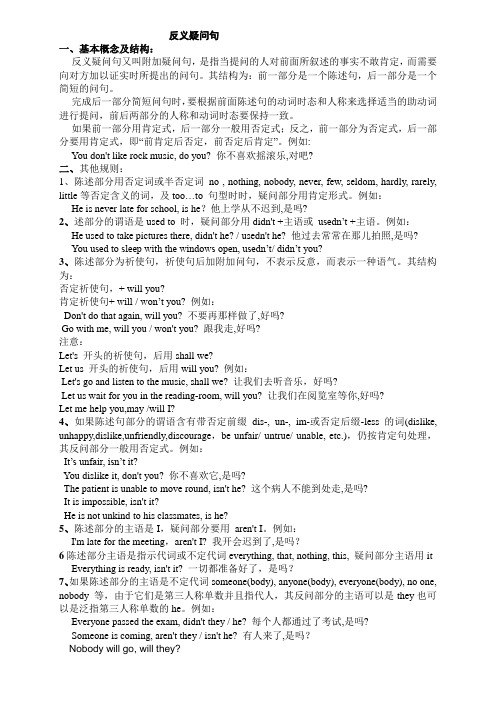
反义疑问句一、基本概念及结构:反义疑问句又叫附加疑问句,是指当提问的人对前面所叙述的事实不敢肯定,而需要向对方加以证实时所提出的问句。
其结构为:前一部分是一个陈述句,后一部分是一个简短的问句。
完成后一部分简短问句时,要根据前面陈述句的动词时态和人称来选择适当的助动词进行提问,前后两部分的人称和动词时态要保持一致。
如果前一部分用肯定式,后一部分一般用否定式;反之,前一部分为否定式,后一部分要用肯定式,即“前肯定后否定,前否定后肯定”。
例如:You don't like rock music, do you? 你不喜欢摇滚乐,对吧?二、其他规则:1、陈述部分用否定词或半否定词no , nothing, nobody, never, few, seldom, hardly, rarely, little等否定含义的词,及too…to 句型时时,疑问部分用肯定形式。
例如:He is never late for school, is he?他上学从不迟到,是吗?2、述部分的谓语是used to 时,疑问部分用didn't +主语或usedn’t +主语。
例如:He used to take pictures there, didn't he? / usedn't he? 他过去常常在那儿拍照,是吗?You used to sleep with the windows open, usedn’t/ didn’t you?3、陈述部分为祈使句,祈使句后加附加问句,不表示反意,而表示一种语气。
其结构为:否定祈使句,+ will you?肯定祈使句+ will / won’t you?例如:Don't do that again, will you? 不要再那样做了,好吗?Go with me, will you / won't you? 跟我走,好吗?注意:Let's 开头的祈使句,后用shall we?Let us 开头的祈使句,后用will you? 例如:Let's go and listen to the music, shall we? 让我们去听音乐,好吗?Let us wait for you in the reading-room, will you? 让我们在阅览室等你,好吗?Let me help you,may /will I?4、如果陈述句部分的谓语含有带否定前缀dis-, un-, im-或否定后缀-less的词(dislike, unhappy,dislike,unfriendly,discourage,be unfair/ untrue/ unable, etc.),仍按肯定句处理,其反问部分一般用否定式。
10.最全语法之反义疑问句

3 .当陈述部分的主语是不定代词 everything, nothing, anything, something时,附加 疑问句中的主语 一般用it,不用they。 Everything seems all right now, doesn’t it ___________? is it Nothing is kept in good order,_____?
4 、当陈述部分的主语是指示代词this, that或these, those时,附加疑问句中 的主语分别用it和they。如: isn’t it This is important,_________? is it That isn’t correct,________? These are your friends Tom and Jack, aren’t they _______________?
2. 一般动词(play, study, watch 等)句型:
现在 主语+play/plays…, don’t (doesn’t) + 主语? 过去 主语+played…, didn’t + 主语? doesn’t she 1 Your mother likes cooking ,_____________? doesn’t he 2 He has an apple, ______________? didn’t it 3 The plane took off an hour ago, ___________? 4 He didn’t go to school late this morning, did he _______? didn’t she 5 Lucy studied pop music, ____________? don’t _____? you 6 You have a good time, ______
职场英语语法详解疑问句--反义疑问句

职场英语语法详解疑问句--反义疑问句一、什么是反义疑问句?反义疑问句是由两个部分组成的复合句,在句末加一个简单句的疑问句,用来征求对方的意见或确认某种情况。
通常,反义疑问句由主句和附带疑问句两部分组成,主句部分是肯定句或否定句,对应的附带疑问句部分则相反。
二、反义疑问句的构成方式1. 正反义构成:在肯定句后加否定疑问句,或在否定句后加肯定疑问句。
例如:He is a student, isn't he?他是学生,对吗?He isn't a student, is he?他不是学生,对吗?2. 反非构成:在非肯定句后加非否定疑问句,或在非否定句后加非肯定疑问句。
例如:You won't go, will you?你不会去,对吗?You will go, won't you?你会去,对吗?三、反义疑问句的作用1. 征求对方的意见:反义疑问句常用于征求对方的意见或建议,以增加交流和沟通的效果。
例如:I think we should start now, don't you?我认为我们应该现在开始,你觉得呢?2. 确认某种情况:反义疑问句还可以用来确认某种情况,确保双方对某件事情有共同的认识。
例如:The meeting is at 2 p.m., isn't it?会议是在下午两点,对吗?四、注意事项和常见误区1. 主句和附带疑问句的时态、人称要保持一致。
2. 如果主句是肯定句,附带疑问句为否定形式;如果主句是否定句,附带疑问句为肯定形式。
3. 在口语中,反义疑问句常常使用缩略形式,如:isn't、aren't、won't、wouldn't等。
五、总结反义疑问句在职场英语交流中常用于征求意见、确认情况等,通过研究反义疑问句的构成方式和使用技巧,我们可以提升自己在英语交流中的表达能力和沟通效果。
以上是关于职场英语语法详解疑问句--反义疑问句的内容,希望对您有所帮助。
反义疑问句的规则和用法
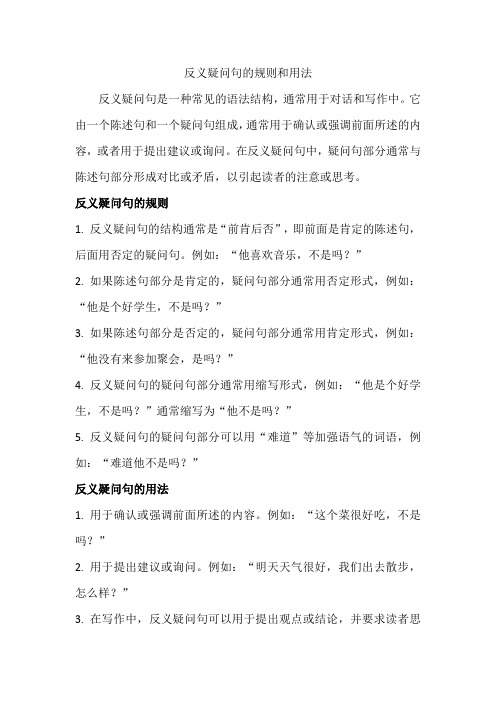
反义疑问句的规则和用法
反义疑问句是一种常见的语法结构,通常用于对话和写作中。
它由一个陈述句和一个疑问句组成,通常用于确认或强调前面所述的内容,或者用于提出建议或询问。
在反义疑问句中,疑问句部分通常与陈述句部分形成对比或矛盾,以引起读者的注意或思考。
反义疑问句的规则
1. 反义疑问句的结构通常是“前肯后否”,即前面是肯定的陈述句,后面用否定的疑问句。
例如:“他喜欢音乐,不是吗?”
2. 如果陈述句部分是肯定的,疑问句部分通常用否定形式,例如:“他是个好学生,不是吗?”
3. 如果陈述句部分是否定的,疑问句部分通常用肯定形式,例如:“他没有来参加聚会,是吗?”
4. 反义疑问句的疑问句部分通常用缩写形式,例如:“他是个好学生,不是吗?”通常缩写为“他不是吗?”
5. 反义疑问句的疑问句部分可以用“难道”等加强语气的词语,例如:“难道他不是吗?”
反义疑问句的用法
1. 用于确认或强调前面所述的内容。
例如:“这个菜很好吃,不是吗?”
2. 用于提出建议或询问。
例如:“明天天气很好,我们出去散步,怎么样?”
3. 在写作中,反义疑问句可以用于提出观点或结论,并要求读者思
考或回应。
例如:“难道我们应该容忍这种行为吗?”
4. 在口语中,反义疑问句可以用于加强语气或表达情感。
例如:“难道你不觉得这样做很过分吗?”
反义疑问句是一种常见的语法结构,在对话和写作中都有广泛的应用。
通过使用反义疑问句,我们可以确认或强调前面所述的内容,提出建议或询问,或者在写作中提出观点或结论,并要求读者思考或回应。
同时,在口语中,反义疑问句也可以用于加强语气或表达情感。
英语反义疑问句的用法归纳总结

英语反义疑问句的用法归纳总结引言英语中的反义疑问句是一种常用的语法结构,用于提出问题或询问对方是否同意或不同意某种观点。
本文将归纳总结英语中反义疑问句的用法,包括构成、基本规则和常见应用场景。
构成英语中的反义疑问句通常由两个部分组成:一个主句和一个疑问句。
主句是一个陈述句,疑问句是一个疑问句。
一个常见的构成模式是:主句前面是陈述句,疑问句使用反意疑问句结构。
例如:•陈述句 + 否定疑问句:He is a doctor, isn’t he?•陈述句 + 肯定疑问句:She can swim, can’t she?基本规则在构成反义疑问句时,需要注意以下基本规则:1.陈述部分和疑问部分之间通常存在反义关系。
例如,如果陈述句是肯定的,则疑问句应该是否定的;反之亦然。
2.反义疑问句中的疑问部分与主句的主语和谓语形式保持一致。
例如,如果主句使用了肯定形式的动词,疑问部分也应该使用相应的肯定形式的助动词。
3.如果主句陈述的是事实,疑问部分应该使用反义疑问句,如果主句陈述的是假设或假想,疑问部分应该使用普通疑问句。
常见应用场景反义疑问句在日常交流中非常常见,常用于以下情况:1. 确认陈述句反义疑问句经常用于确认陈述句的正确性或错误性。
例如:•You are a student, aren’t you?•This is the right way, isn’t it?2. 做出请求反义疑问句也可以用于向对方提出请求,表示期待对方同意或不同意。
例如:•Let’s go to the cinema, shall we?•Help me with this, will you?3. 提出建议反义疑问句还常用于提出建议,询问对方是否同意或不同意。
例如:•We should go on a trip, shouldn’t we?•Why don’t you try this new restaurant, eh?4. 表示礼貌在表示礼貌或客气时,也常使用反义疑问句。
高中英语语法反义疑问句-PPT
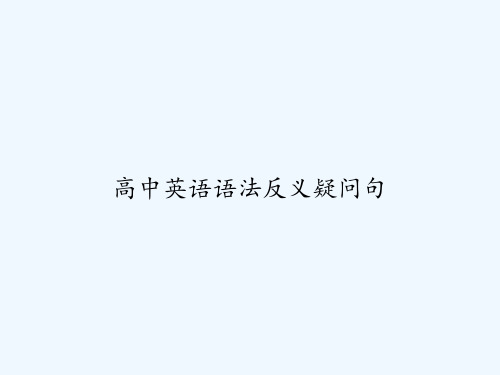
3)含有ought to 的反意疑问句, 陈述部分是肯定的,疑问部分 用oughtn't +主语。
He ought to know what to do, oughtn't he?
大家有疑问的,可以询问和交流
可以互相讨论下,
4)陈述部分有 have to + v. (had to + v.),疑问部分常用don't + 主语(didn't +主语)。
2.陈述部分为否定式 + 疑问部 分就为肯定式
You didn’t go, did you?
He can’t ride a bike, can he?
请注意以下句型的反义疑 问句:
1)陈述部分的主语是I,疑问部 分要用 aren't I.
I’m as tall as your sister, aren't I?
14)前有情态动词dare或need, 疑问部分用 need (dare ) +主语。
We need not do it again, need we ? He dare not say so, dare you?
当dare, need 为实义动词时, 疑问部分用助动词 do + 主语。
She doesn't dare to go home alone, does she?
I am a student, aren’t I?
2)陈述部分用 no, nothing, nobody, never, few, seldom, hardly, rarely, little等否定含义 的词时,疑问部分用肯定含义。
The Swede made no answer, did he / she? Some plants never blown (开花), do they ?
2024年初中英语语法一轮复习之反义疑问句用法归纳
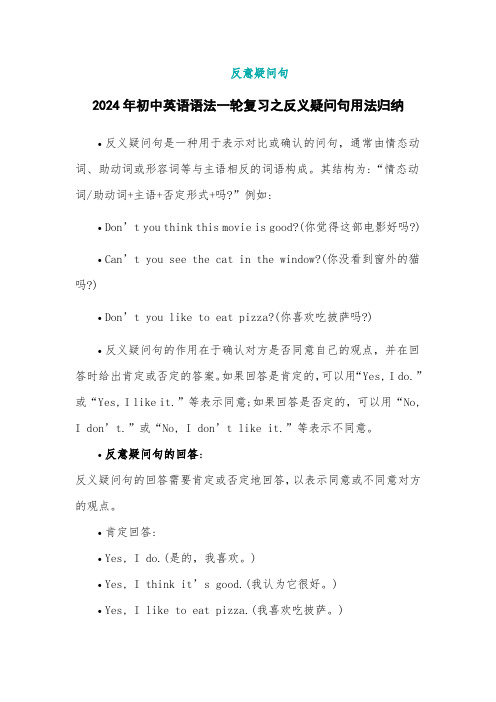
反意疑问句2024年初中英语语法一轮复习之反义疑问句用法归纳•反义疑问句是一种用于表示对比或确认的问句,通常由情态动词、助动词或形容词等与主语相反的词语构成。
其结构为:“情态动词/助动词+主语+否定形式+吗?”例如:•Don’t you think this movie is good?(你觉得这部电影好吗?) •Can’t you see the cat in the window?(你没看到窗外的猫吗?)•Don’t you like to eat pizza?(你喜欢吃披萨吗?)•反义疑问句的作用在于确认对方是否同意自己的观点,并在回答时给出肯定或否定的答案。
如果回答是肯定的,可以用“Yes, I do.”或“Yes, I like it.”等表示同意;如果回答是否定的,可以用“No, I don’t.”或“No, I don’t like it.”等表示不同意。
•反意疑问句的回答:反义疑问句的回答需要肯定或否定地回答,以表示同意或不同意对方的观点。
•肯定回答:•Yes, I do.(是的,我喜欢。
)•Yes, I think it’s good.(我认为它很好。
)•Yes, I like to eat pizza.(我喜欢吃披萨。
)•否定回答:•No, I don’t.(不,我不喜欢。
)•No, I don’t think it’s good.(不,我觉得它不好。
)•No, I don’t like to eat pizza.(不,我不喜欢吃披萨。
) •需要注意的是,在回答反义疑问句时,应该使用正确的语法和标点符号,以确保回答的准确性和清晰度。
回答反义疑问句的原则回答反义疑问句的原则是:肯定回答用“Yes, I do.”或“Yes, I think it’s good.”等表示同意;否定回答用“No, I don’t.”或“No, I don’t think it’s good.”等表示不同意。
初中语法-反义疑问句解析及练习

• —Yes, she has. 不,来过。 • —No, she hasn’t是的,没来过
• 1. ——You won't follow his example, will you?
there? 4.Nothing is in the room, _i_s_ it?
5.The boys and girls have never been to Chongqing, _h_a_v_e__ they?
三. 反意疑问句的陈述部分为 I am… 时, 问句部分习惯上 用 aren’t I?表 示。
• ( )2. His sister have a bad cough, ___B_____ she?
• (A) wasn't (B) doesn't (C) hadn't (D) didn't
• ( )3. John can hardly understand any Chinese, __C_____ he?
to Canada, __A_____?
(A) will she
(B) won't she
(C) isn't she
(D) wasn't she
1. Tom helped me a lot last year, ___d_id_n_’t_ ______h_e_ ?
2.They haven’t been to the Great Wall, __h_a_ve__ __t_h_e_y__ ?
② Nothing has happened to them, has it?
反义疑问句语法总结
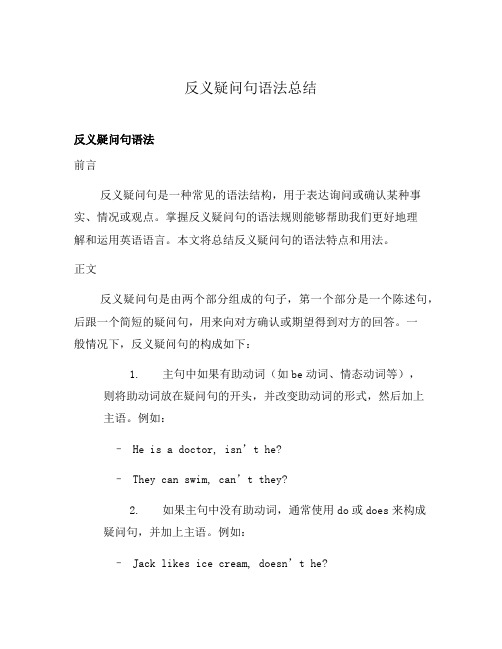
反义疑问句语法总结反义疑问句语法前言反义疑问句是一种常见的语法结构,用于表达询问或确认某种事实、情况或观点。
掌握反义疑问句的语法规则能够帮助我们更好地理解和运用英语语言。
本文将总结反义疑问句的语法特点和用法。
正文反义疑问句是由两个部分组成的句子,第一个部分是一个陈述句,后跟一个简短的疑问句,用来向对方确认或期望得到对方的回答。
一般情况下,反义疑问句的构成如下:1.主句中如果有助动词(如be动词、情态动词等),则将助动词放在疑问句的开头,并改变助动词的形式,然后加上主语。
例如:–He is a doctor, isn’t he?–They can swim, can’t they?2.如果主句中没有助动词,通常使用do或does来构成疑问句,并加上主语。
例如:–Jack likes ice cream, doesn’t he?–She plays the piano, doesn’t she?3.当主句中含有否定词(如n’t),则将否定形式的助动词放在疑问句的开头,再加上主语。
例如:–They haven’t seen the movie, have they?–She isn’t c oming, is she?4.如果主句中是肯定的陈述句,疑问句部分一般使用否定形式,反之亦然。
例如:–You are going to the party, aren’t you?–He doesn’t like coffee, does he?除了构成疑问句的助动词或do/does之外,其他词的形式不发生变化。
而陈述句和疑问句的主语一般保持一致,即如果主句的主语是第三人称单数形式,那么疑问句的主语也应为第三人称单数形式。
反义疑问句常用于以下情况:•提出询问或确认的问题,寻求对方的回答或意见;•用于社交场合,以便获得更多的信息或确认对方的观点;•表达自己的疑虑、不确定或期待。
结尾反义疑问句是英语中常见的语法结构之一,掌握其构成和使用规则对于提高英语交流能力非常重要。
反义疑问句的语法讲解
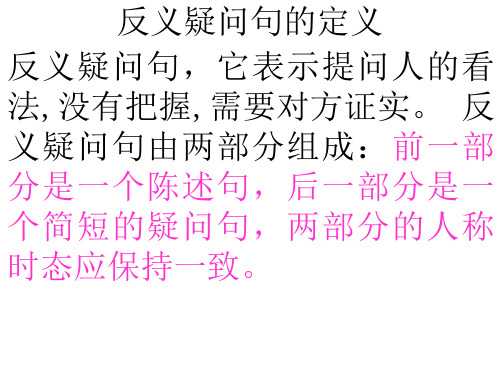
(3)当must用来表示对现在的情 况进行推测时,问句通常要根据Байду номын сангаасmust后面的动词采用相应的形式。 He must be good at English,isn'the? 他英语一定学 得很好,是吗?
(4)当must+have done表示对过去的 情况进行推测(一般句中有明确的过去 时间状语),问句要根据陈述部分的情 况 用 “ d i d n ' t + 主 语 ” 或 “wasn't/weren't+主语”;如果强调动 作的完成(一般没有明确的过去时间状 语),问句要用“haven't/hasn't+主 语”。例如:She must have read the novel last week,didn't she? 她上星期一 定读了小说是吗?
反义疑问句的定义 反义疑问句,它表示提问人的看 法,没有把握,需要对方证实。 反 义疑问句由两部分组成:前一部 分是一个陈述句,后一部分是一 个简短的疑问句,两部分的人称 时态应保持一致。
反义疑问句的句型解释及读法
句型解释:1.陈述部分肯定式+疑问部分 否定式 可记为 前肯后否定。 2.陈述部分否定式+疑问部分肯定式 可 记为 前否后肯定。例如 :They work hard, don’t they? 读法规则:附加疑问句陈述部分用降调, 问句部分可升可降。提问者对陈述部分 把握较大时,问句部分用降调;反之用 升调。
反义疑问句的归纳总结
1) I'm ...aren't I? 2) Ihave to ....don'tI?/Ihad to...didn'tI? 3)Iwould rather ...wouldn't I... 4)感叹句中,疑问部分用be +主语 5)陈述部分主语是指示代词或不定代词everything, that, nothing that, 疑问部分主语用it.例如:I Everything is ready, isn't it? 6)Let's ...shall we? Let us ...will you? 例如:Let's go and listen to the music, shall we? Let us wait for you in the reading-room, will you ?
- 1、下载文档前请自行甄别文档内容的完整性,平台不提供额外的编辑、内容补充、找答案等附加服务。
- 2、"仅部分预览"的文档,不可在线预览部分如存在完整性等问题,可反馈申请退款(可完整预览的文档不适用该条件!)。
- 3、如文档侵犯您的权益,请联系客服反馈,我们会尽快为您处理(人工客服工作时间:9:00-18:30)。
单词妙记
超级单词
SEE短语说说看
SEE短语串串记
Be more frank. I can see through you that you don't have money to see this month out. All right, I'll see you through because I'm your friend anyway,but you'd better see to it that you can pay me off.
坦白点吧。
我知道你这月钱不够花了,我会帮你的,我是你朋友嘛,但你得确保能还我。
高中必备短语
恶补语法——反义疑问句(一)
1.含有特殊主语的反义疑问句
(1)如果陈述部分的主语是指人的不定代词如no one, nobody, everyone, someone, everybody, somebody, none等时,其附加疑问句的主语强调全部用they,强调个体用he。
No one phoned me while I was out, did they? 我不在时没人给我打电话吧?
Everyone is having a good time, aren't they? 每个人都玩得很开心,对吧?
Someone is expecting you, isn't he? 有人在等你,是吧?
(2)陈述部分用不定代词one作主语,附加部分的主语在正式场合用one,在非正式场合用you。
One can't be too careful, can one (you)? 必须十分小心,对吧?
(3)当陈述部分的主语是指示代词时,其后的附加问句的主语要用相应的人称代词。
即this或that后用it, these或those后用they。
That was a hundred years ago, isn't it? 那是在100年前,对吧?
Those are yours, aren't they? 这些都是你的了,不是吗?
(4)以表示“存在”的there引导陈述部分时,其后的附加句仍用there。
There will be a special exhibition tomorrow, isn't there? 明天会有一个特别展览,对吧?
There used to be a lake here, usedn't /didn't/ there? 这里过去有一个湖,是不是?
2.祈使句的反义疑问句
(1)祈使句后面的附加句一般用will you或won't you。
Come and sit down, won't you? 进来坐,好吗?
Give me a hand, will you? 帮我一把,行吗?
(2)以Let's开头的祈使句,后面的附加部分要用shall we,而以Let us或Let me开头的祈使句,其后的附加句部分用will you。
Let's try another way, shall we? 让我们试试,行吗?
Let us have a go, will you? 让我们试试,行吗?
(3)若陈述部分是否定的祈使句,问句部分除了用will you外,也可用can you。
Don't make much noise, will/can you? 别这么大声,行吗?
1. He must be helping the old man to water the flower, _______? (2009.陕西)
A.is he
B.isn’t he
C. must he
D. mustn't he
2. You and I could hardly work together, _______?(2009.福建)
A. could you
B. couldn't I
C. couldn't we
D. could we
KEYS
1.B
【解】陈述部分有表示推测的must,反义疑问句的附加部分的动词与must后的动词形式一致。
根据本题的be helping判断用isn't he。
2.D
【解】反义疑问句的陈述部分的主语是you and I,附加问句部分用we;陈述部分有否定副词hardly,,附加问句部分用肯定形式,故选D。
